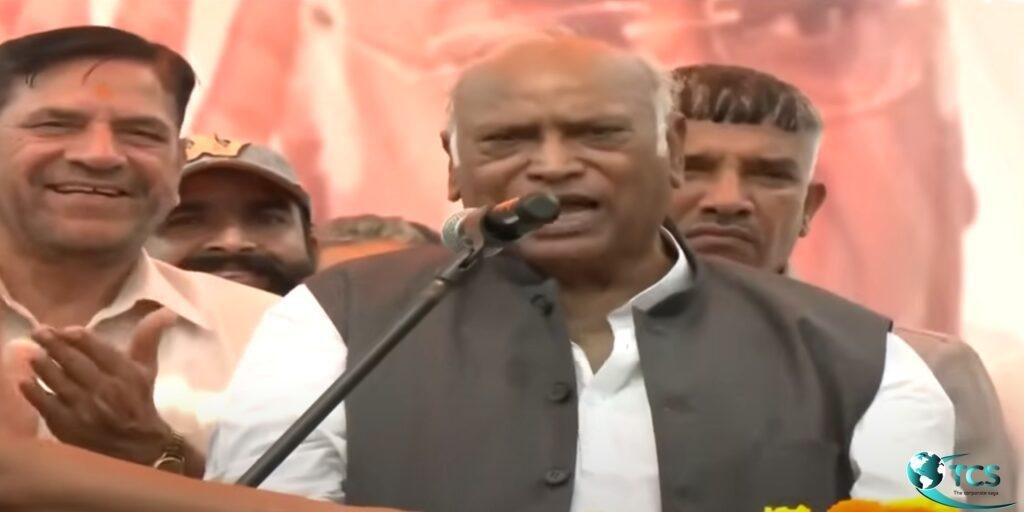Amit Shah Criticizes M. Kharge's Controversial Comment: "Will Stay Alive Till..."
Words matter a lot in Indian politics and even seemingly simple statements can trigger a national debate. Recently, Congress President Mallikarjun Kharge’s remarks created controversy, prompting Home Minister Amit Shah to vocally criticise the remarks. HARGE’s comment “Will Survive …” has not only the center of attention, but also a strong response from various districts, especially the DZHANAT BHARATII (BJP). Immerse yourself in this case and have a wider result in India’s political landscape.

The Controversial Comment by M Kharge: What Was Said?
At a recent political rally, Mallikarjun Kharge made a comment that immediately grabbed attention. While speaking to the crowd, Kharge allegedly stated, “I will live to witness the end of the Modi government.” This seemingly casual remark holds significant political implications that have unsettled the power circles in New Delhi. Many interpreted the statement as a direct challenge to Prime Minister Narendra Modi’s leadership and the BJP government. Kharge’s comment appeared to stem from frustration regarding what the Congress views as the undermining of democratic values under the Modi administration. Nonetheless, his choice of words provoked a strong reaction from the ruling party, particularly Amit Shah, who deemed the statement highly inappropriate and divisive.
Amit Shah's Response: A Criticism Rooted in Political Ethics
Amit Shah, the Union Home Minister, didn’t take long to address Kharge’s contentious remark. Shah, who is renowned for his astute political judgment and strategic planning, turned to the media to voice his disapproval of the statement. He called Kharge’s comment “disgraceful,” highlighting the need for political conversation in India to be devoid of insults to individuals and to center on issues of policy, development, and national advancement.
Amit Shah criticized the remarks, stating that although political rivalry is healthy for democracy, they should not be used to intimidate or wish damage to political personalities. He urged the leaders of the opposition to act civilly, saying that policies and ideas should be the major weapons in political conflicts rather than personal grudges.
Historical Context: Political Rhetoric in Indian Democracy
India’s democratic past is replete with instances of political hyperbole. Strong language and stirring speeches have always been hallmarks of Indian politics, from Indira Gandhi’s audacious remarks during the Emergency to Mahatma Gandhi’s nonviolent endeavors. But it appears that the political conversation has taken a negative turn lately, with divisive remarks and personal assaults becoming more common.
This tendency is seen in Kharge’s remark of “staying alive till the end of Modi’s government.” Indian politicians have frequently delivered passionate speeches, but others contend that these remarks take attention away from the pressing problems at hand, which include unemployment, economic growth, healthcare, and education.
Amit Shah’s answer brings to light a more general worry: Is India’s political discourse
becoming less of a high caliber? When prominent national figures use such language, it begs the question of what message the public, and particularly the younger voter generation, is being delivered.
Mallikarjun Kharge and the Congress Party: The Frustration Behind the Words
It is necessary to investigate the political dynamics within the Congress party in order to comprehend the background of Kharge’s remark. The Congress party, which was formerly the main player in Indian politics, has lost several elections, especially since the BJP and Narendra Modi gained popularity. Kharge is among many in the Congress who believe that Modi’s administration has been steadily tearing apart India’s democratic foundation.The Congress has been outspokenly critical of various BJP initiatives, ranging from the contentious repeal of Article 370 to the enactment of the Citizenship Amendment Act (CAA). Modi is seen by Kharge and other Congress leaders as a danger to India’s secular and pluralistic identity as well as an opponent in politics. This could account for Kharge’s emotionally charged “will stay alive” remark. Though many contend that public pronouncements from political leaders should be measured, I find that displeasure is acceptable.
The Importance of Decorum in Political Discourse
The fact that Amit Shah took issue with Kharge’s comment highlights how crucial it is to keep political discourse civil. Political leaders are required to maintain specific norms of conduct in democracies around the world, particularly in public forums. When one uses harsh or rude language, especially when it makes reference to one’s lifespan or well-being, it can have serious repercussions.
Respect for opposing viewpoints is one of the main tenets of democratic society. Even when political party leaders have different philosophies and ideas, they nevertheless need to respect one another. A leader like Kharge runs the danger of coming across as antagonistic and fueling a toxic political climate when they make remarks suggesting that they will “stay alive” until a specific regime is overthrown.
This is how Amit Shah’s request for civil conversation should be seen. Indian leaders can lead by example and guarantee that public discussions stay focused on the matters that are really important by emphasizing policy differences over personal jabs.
Public Reactions: Social Media and Beyond
Political remarks like Kharge’s “will stay alive till…” remark circulate quickly in the era of social media. The public’s reactions were all over Twitter, Facebook, and other platforms almost immediately after the news emerged. Kharge’s comment was justified by some, who said that he was expressing his resolve to oppose what he saw as dictatorship. Some, on the other hand, thought the comment was disgusting and questioned whether such language belonged in political discourse.Internet users responded in kind to Amit Shah’s answer to the remark. While opponents of the ruling party charged that the BJP was restricting free speech, BJP supporters applauded Shah for adopting a strong stance against divisive discourse. The controversy has further intensified public discourse about the incident by making its way into newspaper editorials and televised debates.
Political Polarization: A Deeper Issue in Indian Democracy
Political division is a bigger problem in Indian democracy, which is reflected in the episode involving Kharge’s comment and Amit Shah’s criticism. India has witnessed a widening gulf between BJP and Congress supporters throughout the last ten years. Political leaders are not the only ones affected by this polarization; families, communities, and even businesses are frequently split along political lines.Shah’s reply to Kharge’s assertion serves as a metaphor for this pervasive division. The contrasting perspectives of both leaders regarding India’s future are reflected in their verbal altercations, which are a reflection of the ideological conflict between the Congress and the BJP. While political competitiveness is a necessary component of democracy, there are worries that the middle ground—where productive discussion and compromise previously flourished—is being undermined by the growing polarization.
Moving Forward: The Need for Civil Political Engagement
Events like Kharge’s contentious remark and Amit Shah’s reply will continue to influence the political landscape as India gets ready for the upcoming general elections. Political leaders, though, need to make a deliberate effort to have polite conversations if Indian democracy is to thrive. It is imperative that both the government and opposition parties acknowledge the importance of prioritizing policy solutions over personal attacks.
The request for civil discourse made by Amit Shah is a significant start in the right direction. Nonetheless, it is imperative that political leaders from all parties, including the BJP, adhere to their own principles. India’s democracy can only survive by encouraging an atmosphere of respect for one another and fruitful discussion.
Conclusion
Amit Shah has led the criticism of Mallikarjun Kharge’s remark, “Will stay alive till..” as disrespectful and polarizing, sparking a national conversation. The incident serves as a reminder of the responsibility that comes with holding public office as well as the influence that words have in political discourse. Political leaders from all parties must place a higher priority on constructive and courteous discourse than on personal attacks as Indian democracy develops. By doing this, they can guarantee that the democratic values that India holds dear are upheld for many years to come and serve as an example for the future generation.
